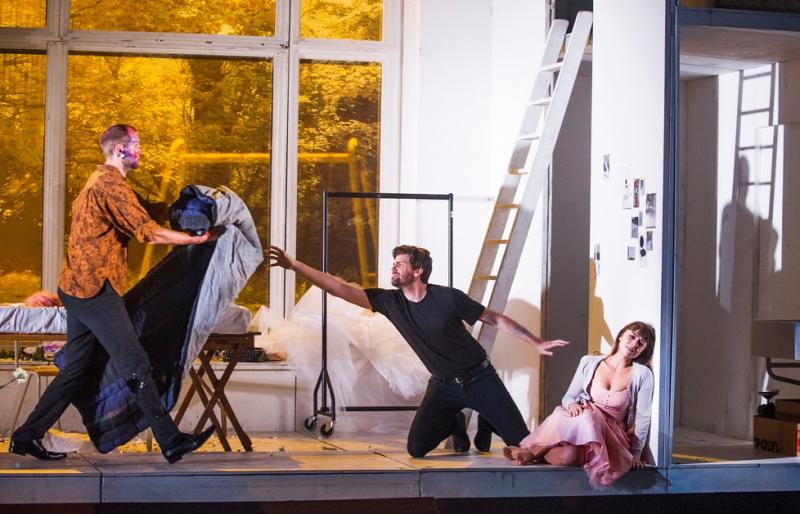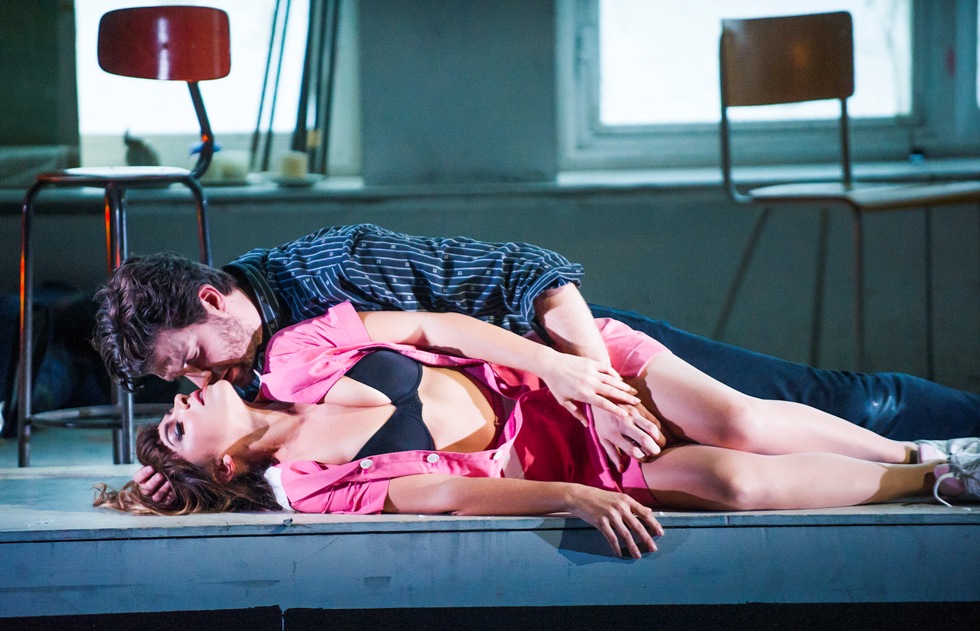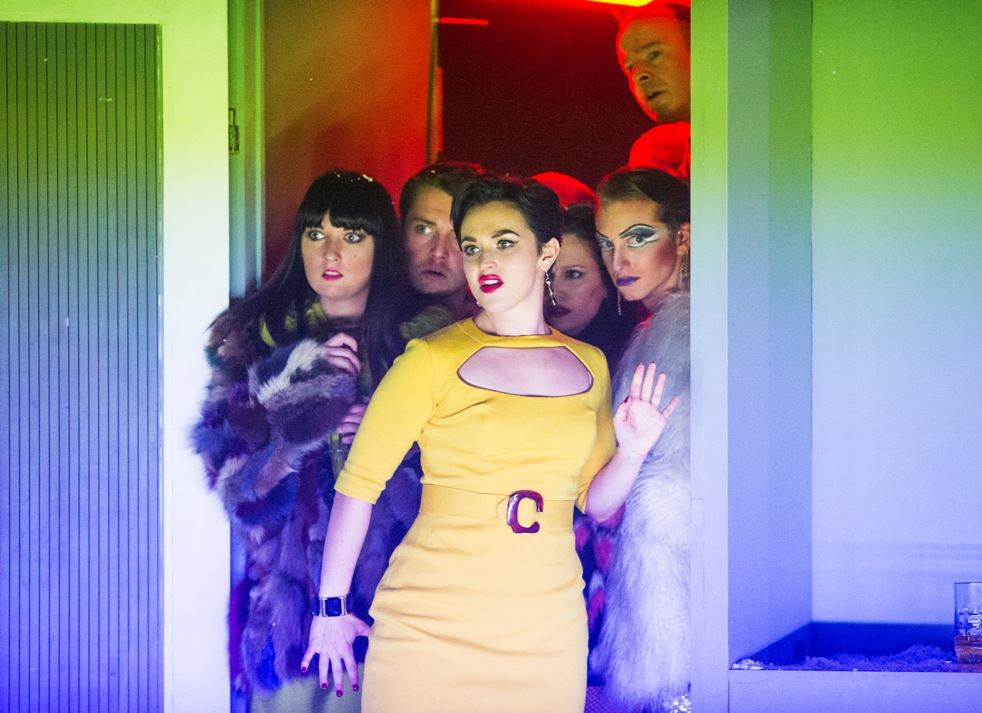La Bohème, English National Opera | reviews, news & interviews
La Bohème, English National Opera
La Bohème, English National Opera
Heroin-blighted update of Puccini's realistic tragicomedy is no hit, and sludgily conducted

Kurt Cobain’s “Smells like Teen Spirit’ cued a realistic song and drink routine for Chekhov’s Three Sisters in a hit-and-miss update by director Benedict Andrews. This one, with a Puccini soundtrack unsupportively conducted by Xian Zhang, smells more like routine spirit with a couple of jolts along the way, a sludgy requiem for drug-fuelled twenty-somethings.
Moving forward in time the action of Puccini’s inspiration, Henri Murger’s still fresh and authentic memories of bohemian youth in 1830s Paris, is more the rule than the exception now. The late Steven Pimlott did it with more infill at ENO than his successor Jonathan Miller; David McVicar made it real and contemporary at Glyndebourne, but a DVD of Baz Luhrmann’s Opera Australia production shows that his is the one we should have had here.
Fellow Antipodean Andrews lends another turn of the screw by having Rodolfo conjure his poetic “castles in the air” by getting new acquaintance Mimì to pull the rubber tight around his arm while he injects; she knows what to do, it seems, and he returns the compliment. So they get their “romance” in Puccini’s wonderful construction of two aria-narratives and a duet on a high, while the audience can only be turned off by what should be touching, unassisted love at first sight (Winters and Borichevsky pictured below).
 At least you don’t have to take the moonlight literally, if it's part of the fix, while it’s been a bit hard to accept any fumbling in the dark when it’s still a winter’s day beyond the frosted studio windows and only the characters are in silhouette (hard to see Rodolfo’s face for the first 10 or so minutes). Amanda Holden's not always well-fitting translation caters for some of the updated details (a pink wig for Mimì rather than a bonnet; no stairs for her to climb to the artists' studio).
At least you don’t have to take the moonlight literally, if it's part of the fix, while it’s been a bit hard to accept any fumbling in the dark when it’s still a winter’s day beyond the frosted studio windows and only the characters are in silhouette (hard to see Rodolfo’s face for the first 10 or so minutes). Amanda Holden's not always well-fitting translation caters for some of the updated details (a pink wig for Mimì rather than a bonnet; no stairs for her to climb to the artists' studio).
Musically, all is not right at this point either. Zach Borichevsky’s tall, handsome poet has a lightish and mostly pleasing tenor voice not sufficiently grounded to guarantee support; one can only presume he got the crucial top C before the first night (if it's a risk, there's no need for the traditional tenuto on the quaver not in Puccini's score). When he didn't last night, Zhang should have had the theatrical nous to move straight on, but waited for applause that didn’t come, and then failed to lend sympathetic support to Corinne Winters’ dark-voiced “They call me Mimì”, vocally a much more secure proposition.
Zhang is a conductor with good symphonic instincts, aided by ENO strings on glowing current form, but very little operatic experience. It sounds like she’d been listening to Karajan’s opulent Puccini rather than Beecham’s authentic sparkle, and the singers were constantly left wanting to move the music-drama on. Darker in tone than when she sang Violetta for ENO, Winters really opens up in the third act, though it's a shame there's no real plangency in the voice, and again her aria of farewell was disastrously out of synch last night with the orchestra, for which Zhang must take the blame. You might do better to pick a performance when house conductor Martin Fitzpatrick takes over; he'll have a much better idea how to co-ordinate singers and players in an effectively flowing whole.
 The third act is generally cleaner and clearer, if along more traditional lines. Johannes Schütz's set designs and Jon Clark's lighting at last achieve some atmosphere. The Café Momus act before it, though, is a mess. Since it launches, after too long a curtain-down, on the drugged lovers still lying on the floor of the studio, you think it might be a hallucination, but apparently not – just a loosely directed nightmare with too much vaguely happening at the front of the stage. Our pair soon show no signs of their recent hit. Rhian Lois (pictured above), always a sparky singing actress, brightens things up with her Musetta, but why choose a light soprano voice when you could have a fuller-toned, more realistic characterisation of a girl who may be mixed-up but is capable of deeper feelings and may really love her Marcello?
The third act is generally cleaner and clearer, if along more traditional lines. Johannes Schütz's set designs and Jon Clark's lighting at last achieve some atmosphere. The Café Momus act before it, though, is a mess. Since it launches, after too long a curtain-down, on the drugged lovers still lying on the floor of the studio, you think it might be a hallucination, but apparently not – just a loosely directed nightmare with too much vaguely happening at the front of the stage. Our pair soon show no signs of their recent hit. Rhian Lois (pictured above), always a sparky singing actress, brightens things up with her Musetta, but why choose a light soprano voice when you could have a fuller-toned, more realistic characterisation of a girl who may be mixed-up but is capable of deeper feelings and may really love her Marcello?
Neither do the other Bohemians quite make the impact they should. There’s a dangerous spread in Duncan Rock’s voice now, though his Marcello is likeable; Ashley Riches’ Schaunard has a more present sound than Nicholas Masters as Colline, and the Act Four horseplay is lively, but still not enough.
By Act Four, despite the revelation that this is no garret but a ground-floor lodging with kids playing in leafy grounds outside, it’s Bohème-by-numbers. Puccini’s subtle depiction of friends gathering round to do all they can for the dying Mimì should be fairly indestructible, and Andrews thankfully doesn’t meddle with it. Still, I wonder if there was a wet eye in the house last night. It looks like it might be left to Richard Jones – due to stage a much-heralded successor to the John Copley stalwart at the Royal Opera next season – to say something really new but still true about this usually unsubduable masterpiece.
- La bohème at the London Coliseum until 26 November. Martin Fitzpatrick conducts the last two performances
rating
Explore topics
Share this article
The future of Arts Journalism
You can stop theartsdesk.com closing!
We urgently need financing to survive. Our fundraising drive has thus far raised £33,000 but we need to reach £100,000 or we will be forced to close. Please contribute here: https://gofund.me/c3f6033d
And if you can forward this information to anyone who might assist, we’d be grateful.

Subscribe to theartsdesk.com
Thank you for continuing to read our work on theartsdesk.com. For unlimited access to every article in its entirety, including our archive of more than 15,000 pieces, we're asking for £5 per month or £40 per year. We feel it's a very good deal, and hope you do too.
To take a subscription now simply click here.
And if you're looking for that extra gift for a friend or family member, why not treat them to a theartsdesk.com gift subscription?
more Opera
 Help to give theartsdesk a future!
Support our GoFundMe appeal
Help to give theartsdesk a future!
Support our GoFundMe appeal
 Peter Grimes, Welsh National Opera review - febrile energy and rage
In every sense a tour de force
Peter Grimes, Welsh National Opera review - febrile energy and rage
In every sense a tour de force
 Owen Wingrave, RNCM, Manchester review - battle of a pacifist
Orpha Phelan brings on the big guns for Britten’s charge against war
Owen Wingrave, RNCM, Manchester review - battle of a pacifist
Orpha Phelan brings on the big guns for Britten’s charge against war
 Tales of Apollo and Hercules, London Handel Festival review - compelling elements, but a failed experiment
Conceptually the two cantatas just don't work together
Tales of Apollo and Hercules, London Handel Festival review - compelling elements, but a failed experiment
Conceptually the two cantatas just don't work together
 La finta giardiniera, The Mozartists, Cadogan Hall review - blooms in the wild garden
Mozart's rambling early opera can still smell sweet
La finta giardiniera, The Mozartists, Cadogan Hall review - blooms in the wild garden
Mozart's rambling early opera can still smell sweet
 Der fliegende Holländer, Irish National Opera review - sailing to nowhere
Plenty of strong singing and playing, but the staging is static or inept
Der fliegende Holländer, Irish National Opera review - sailing to nowhere
Plenty of strong singing and playing, but the staging is static or inept
 Die Zauberflöte, Royal Academy of Music review - first-rate youth makes for a moving experience
The production takes time to match Mozart's depths, but gets there halfway through
Die Zauberflöte, Royal Academy of Music review - first-rate youth makes for a moving experience
The production takes time to match Mozart's depths, but gets there halfway through
 Mansfield Park, Guildhall School review - fun when frothy, chugging in romantic entanglements
Jonathan Dove’s strip-cartoon Jane Austen works well as a showcase for students
Mansfield Park, Guildhall School review - fun when frothy, chugging in romantic entanglements
Jonathan Dove’s strip-cartoon Jane Austen works well as a showcase for students
 Uprising, Glyndebourne review - didactic community opera superbly performed
Jonathan Dove and April De Angelis go for the obvious, but this is still a rewarding project
Uprising, Glyndebourne review - didactic community opera superbly performed
Jonathan Dove and April De Angelis go for the obvious, but this is still a rewarding project
 Fledermaus, Irish National Opera review - sex, please, we're Viennese/American/Russian/Irish
Vivacious company makes the party buzz, does what it can around it
Fledermaus, Irish National Opera review - sex, please, we're Viennese/American/Russian/Irish
Vivacious company makes the party buzz, does what it can around it
 The Capulets and the Montagues, English Touring Opera review - the wise guys are singing like canaries
There's a bel canto feast when Bellini joins the Mob
The Capulets and the Montagues, English Touring Opera review - the wise guys are singing like canaries
There's a bel canto feast when Bellini joins the Mob
 Mary, Queen of Scots, English National Opera review - heroic effort for an overcooked history lesson
Heidi Stober delivers as beleaguered regent, but Thea Musgrave's opera is limiting
Mary, Queen of Scots, English National Opera review - heroic effort for an overcooked history lesson
Heidi Stober delivers as beleaguered regent, but Thea Musgrave's opera is limiting

Add comment